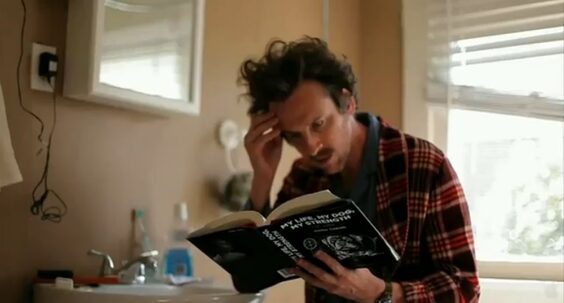
by Allan Day
Going into 'Wrong,' fans of Quentin Dupieux – or his alter-ego, electronic musician Mr. Oizo – have some idea what to expect based on his previous work. Dupieux's creative output is the very definition of absurdity; 'Rubber' even opens with a monologue explaining the absence of reason in pretty much everything, including the film we are about to see. Of course, such a caveat can serve only to invite some viewers to search for meaning and metaphor anyway, in a determination to almost spite the director's instructions.
But while the declared-meaningless 'Rubber' actually lends itself somewhat easily to interpretation, his followup, 'Wrong,' is, for all intents and purposes, exactly that: wrong. The plot is basically simple: Dolph Springer (Jack Plotnick) has lost his dog, Paul, and is desperate to get him back. Along the way is a strange cast of characters, including the animal-mystic Master Chang (William Fichtner), the oft-confused Latino gardener Victor (Eric Judor), the impulsive and bubbly Emma (Alexis Dziena), and Ronnie (Steve Little), the private detective with some unorthodox methods.
Dolph's is a world where strange things tend to happen in defiance of natural (and at times societal) laws, and nobody seems to notice the oddity of such events. A palm tree, for example, which spontaneously becomes a pine tree is a major inconvenience, but the cause of the event is not questioned; rain falls inside an office building and the workers go about their day; a piece of fecal matter is hooked up to a monitor to view its “memory,” somehow expressed visually.
The question is: what is the point? More specifically: is there even a point? Presumably, the director wishes to continue the idea of “no meaning” he expounded in 'Rubber,' but is that really the case? While experimental or avant-garde films will have bits of oddity here and there, 'Wrong' is absolutely inundated with them, and while a viewer desperately seeking meaning despite its apparent lack can find occasional metaphor (the rain in the office perhaps expressing Dolph's sorrow at having lost his job; his neighbor Mike's journey to the supposed “end of the world,” a purgatorial wasteland, obviously representing his lack of direction in his life), one wonders the point of, for example, the palm tree changing form, or Emma's complete inability to differentiate between two obviously opposite people.
In a film completely saturated in absurdity, it seems redundant to ask how we should judge it as a work of art. The debate over the artistic viability of the avant-garde is long and heated, and there is no point in rehashing it here. Taken at face value, the film is a brilliant success. It is well-shot and cleverly written, and there are zero complaints in the acting department, especially from William Fichtner, whose soft voice and soothing accent completely draw the viewer in. Most importantly: 'Wrong' is immensely entertaining, a lot of fun to watch.
And perhaps that is all Dupieux is trying to do: make a fun, lighthearted piece of entertainment, throwing out all evidence of logic in the process. It is undoubtedly a good film, but is it a Great film? How do we even define a Great film? Do we need metaphor, subtext, meaning? Perhaps such things really are there, after all, and if so, were they intended by Dupieux? Or would any findings merely be the desperate scratchings of those who can't let a good time just be a good time?
Is it possible that THIS is what Dupieux is trying to do? To sit back and laugh in the face of those seeking for something they were told upfront does not exist? And if so: what does it say about me, or people like me, who try anyway? Am I merely... Wrong?
![]()

